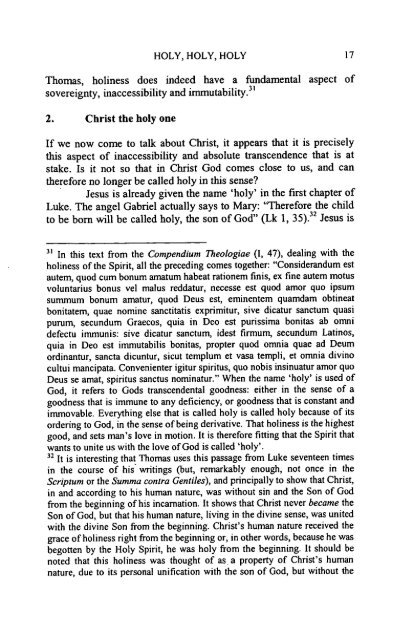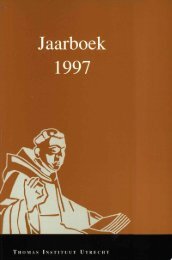Jaarboek Thomas Instituut 2006 - Thomas Instituut te Utrecht
Jaarboek Thomas Instituut 2006 - Thomas Instituut te Utrecht
Jaarboek Thomas Instituut 2006 - Thomas Instituut te Utrecht
Create successful ePaper yourself
Turn your PDF publications into a flip-book with our unique Google optimized e-Paper software.
HOLY, HOLY, HOLY 17<br />
<strong>Thomas</strong>, holiness does indeed have a fundamental aspect of<br />
sovereignty, inaccessibility and immutability."<br />
2. Christ the holy one<br />
If we now come to talk about Christ, it appears that it is precisely<br />
this aspect of inaccessibility and absolu<strong>te</strong> transcendence that is at<br />
stake. Is it not so that in Christ God comes close to us, and can<br />
therefore no longer be called holy in this sense?<br />
. Jesus is already given the name 'holy' in the first chap<strong>te</strong>r of<br />
Luke. The angel Gabriel actually says to Mary: "Therefore the child<br />
to be born will be called holy, the son of God" (Lk 1, 35).32 Jesus is<br />
3) In this <strong>te</strong>xt from the Compendium Theologiae (I, 47), dealing with the<br />
holiness of the Spirit, all the preceding comes together: "Considerandum est<br />
au<strong>te</strong>m, quod cum bonum amatum habeat rationem finis, ex fine au<strong>te</strong>m motus<br />
voluntarius bonus vel malus reddatur, neeesse est quod amor quo ipsum<br />
summum bonum amatur, quod Deus est, eminen<strong>te</strong>m quamdam obtineat<br />
bonita<strong>te</strong>m, quae nomine sanctitatis exprimitur, sive dicatur sanctum quasi<br />
purum, secundum Graecos, quia in Deo est purissima bonitas ab omni<br />
defectu immunis: sive dicatur sanctum, idest firmum, secundum Latinos,<br />
quia in Deo est immutabilis bonitas, prop<strong>te</strong>r quod omnia quae ad Deum<br />
ordinantur, sancta dicuntur, sicut <strong>te</strong>mplum et vasa <strong>te</strong>mpIi, et omnia divino<br />
cultui mancipata. Convenien<strong>te</strong>r igitur spiritus, quo nobis insinuatur amor quo<br />
Deus se amat, spiritus sanctus nominatur." When the name 'holy' is used of<br />
God, it refers to Gods transcendental goodness: either in the sense of a<br />
goodness that is immune to any deficiency, or goodness that is constant and<br />
immovable. Everything else that is called holy is called holy because of its<br />
ordering to God, in the sense of being derivative. That holiness is the highest<br />
good, and sets man's love in motion. It is therefore fitting that the Spirit that<br />
wants to uni<strong>te</strong> us with the love of God is called 'holy'.<br />
32 It is in<strong>te</strong>resting that <strong>Thomas</strong> uses this passage from Luke seven<strong>te</strong>en times<br />
in the course of his' writings (but, remarkably enough, not once in the<br />
Scriptum or the Summa contra Gentiles), and principally to show that Christ,<br />
in and according to his human nature, was without sin and the Son of God<br />
from the beginning of his incarnation. It shows that Christ never became the<br />
Son of God, but that his human nature, living in the divine sense, was uni<strong>te</strong>d<br />
with the divine Son from the beginning. Christ's human nature received the<br />
grace of holiness right from the beginning or, in other words, because he was<br />
begot<strong>te</strong>n by the Holy Spirit, he was holy from the beginning. It should be<br />
no<strong>te</strong>d that this holiness was thought of as a property of Christ's human<br />
nature, due to its personal unification with the son of God, but without the








